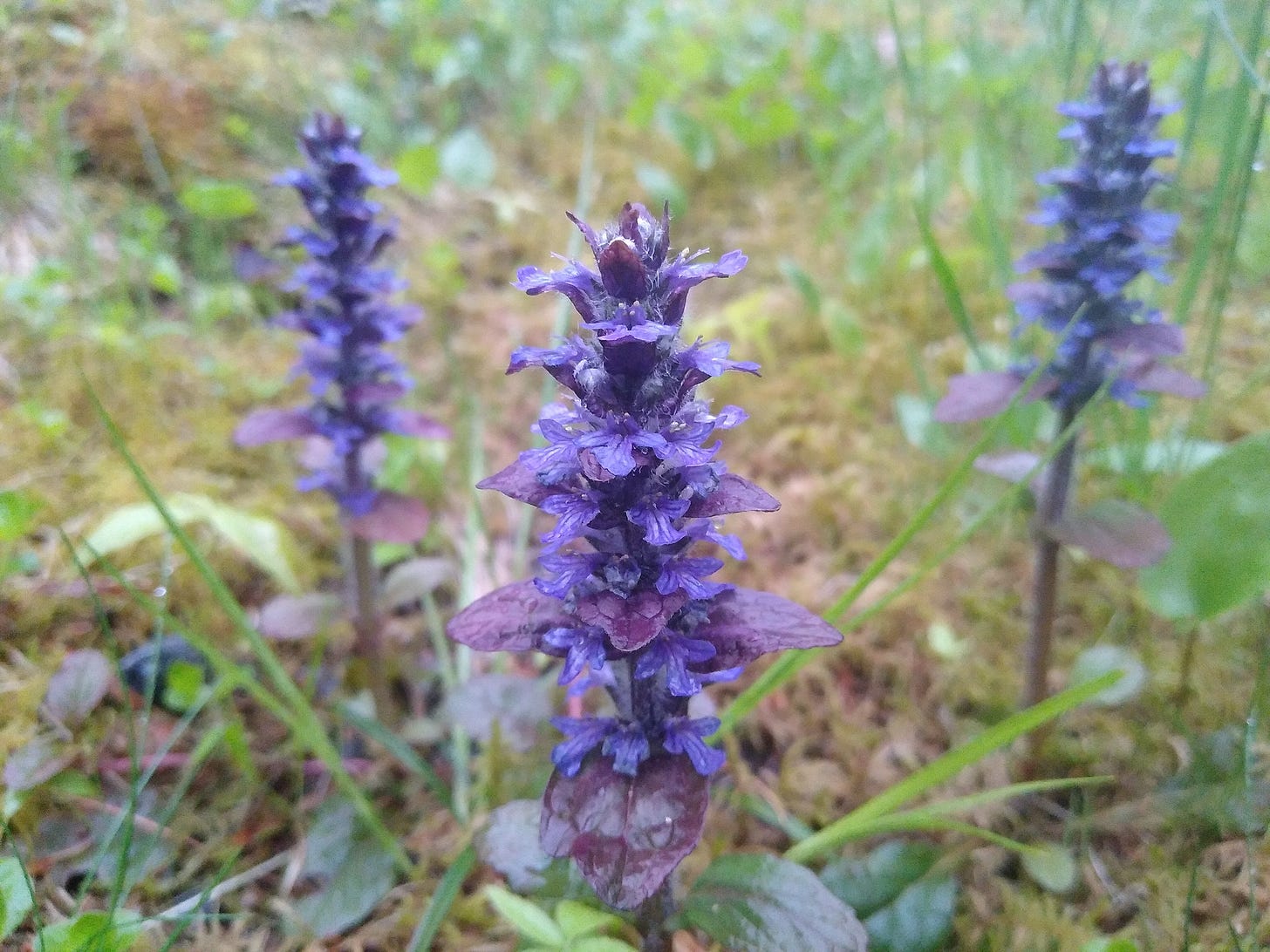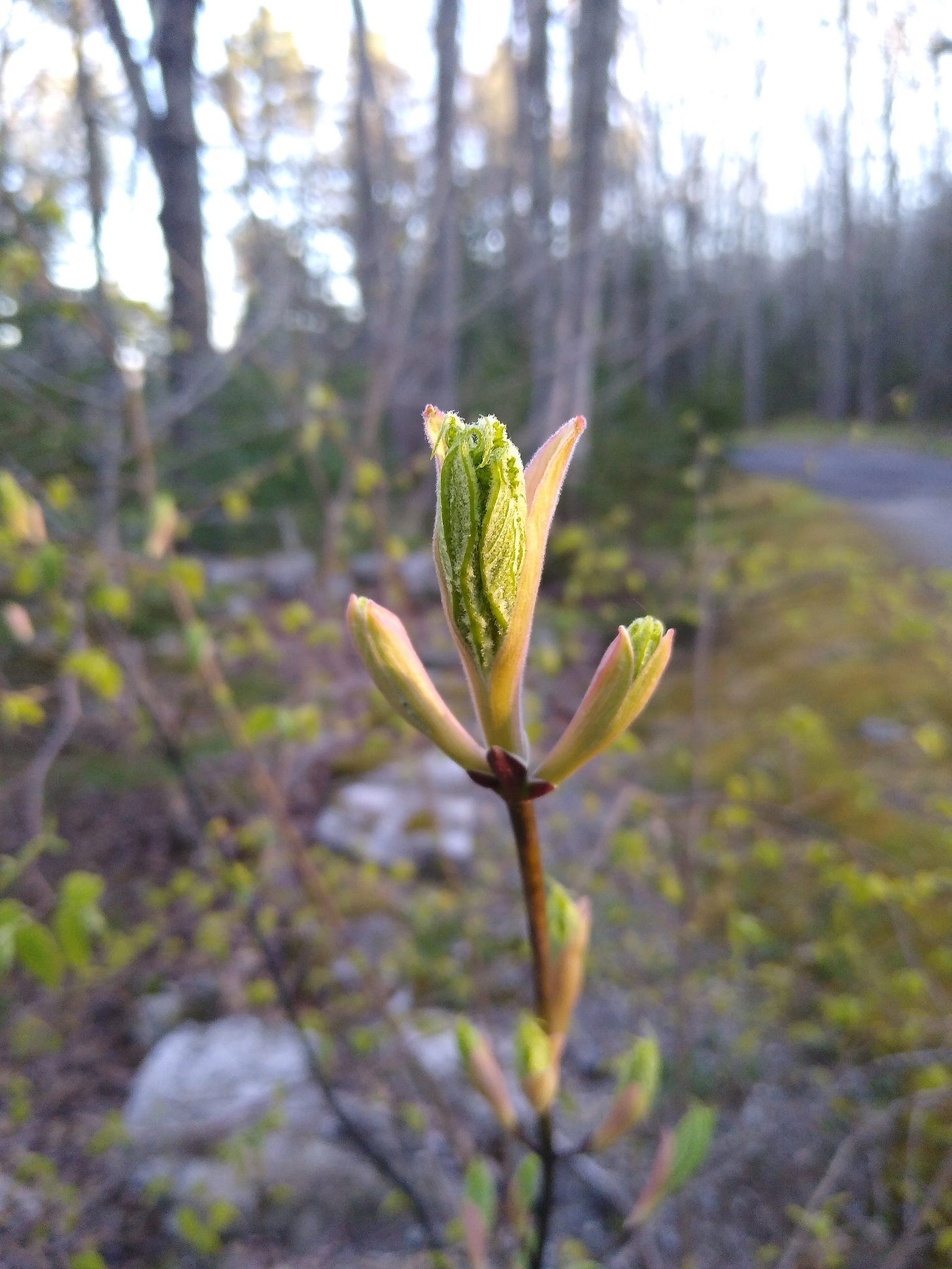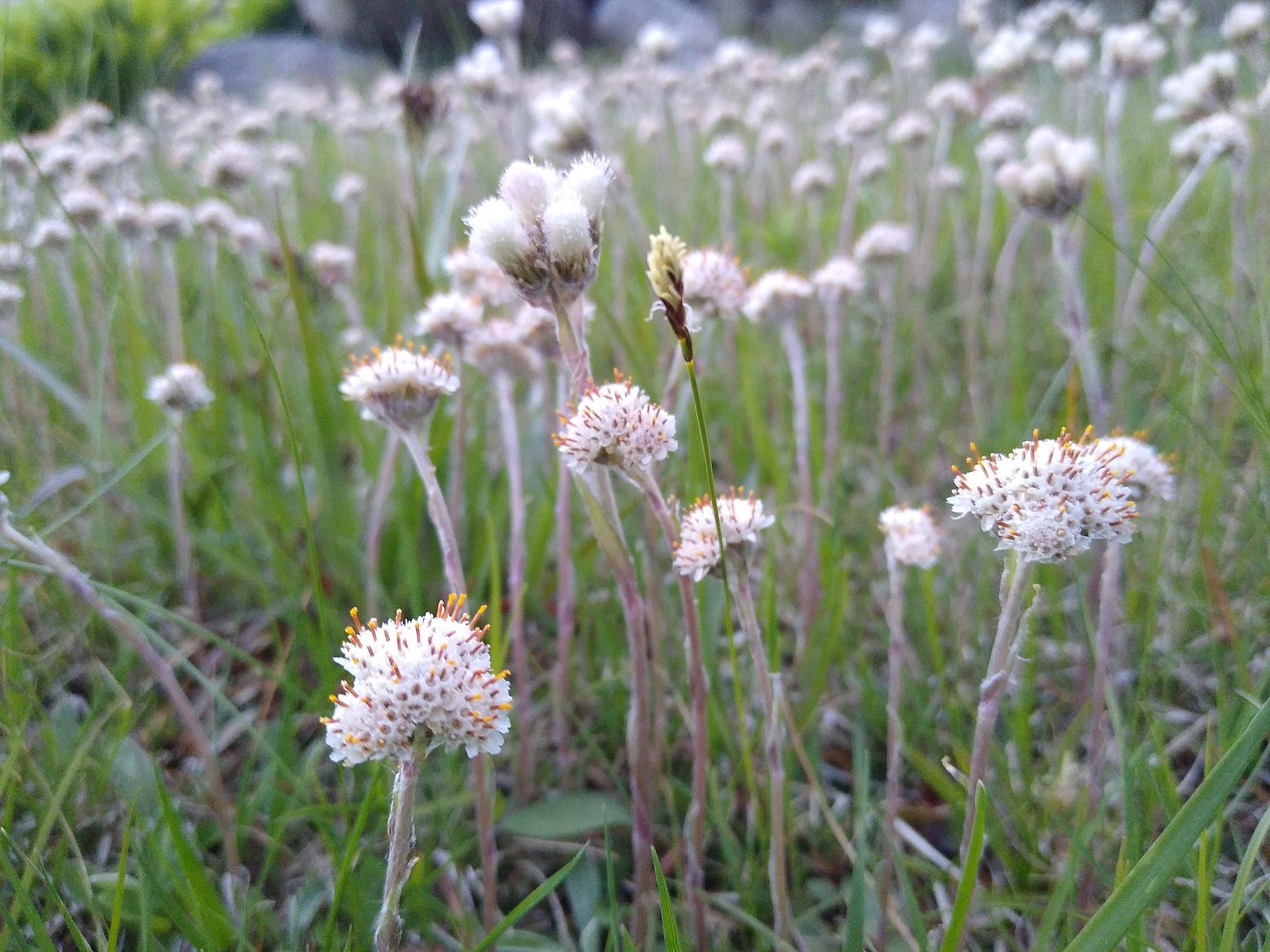What Life Is
5/26/22 – The insult of an aggressive “pro-life” movement in an age of extinctions
Hello everyone:
As always, please remember to scroll past the end of the post to read this week’s curated Anthropocene news.
Now on to this week’s writing:
Life is a natural phenomenon, not a religious one. A religion is a constructed human culture rooted in a set of shared beliefs and behaviors. Faith is a set of metaphysical ideas which bind those beliefs and drive those behaviors. Life does not require faith to exist, but in this age of extinctions it is clear that our beliefs have transformed the natural world.
Note that in the paragraph above I began with the physical and shifted into the metaphysical (i.e. concepts beyond physical perception). That shift from the real – a flower blooming in spring, say – to an abstract, untethered thought in our heads (the flower’s beauty is a gift from God) is a fundamental characteristic of being human. It allows us to re-see the world through metaphor and paintbrush, to re-shape the world with bulldozers and gene editing, and to re-imagine our place in the world with stories of messiahs and gods and space travel.
We are part of nature, of course, but we now push the non-human world away from us while believing we are at its center. Consciousness may be universal (see the story on insect consciousness in this week’s curated news, for example) but the ability and willingness to re-imagine the world for our purposes does not seem to be a characteristic of any other species on Earth.
Once upon a time, the consequences of this cognitive split between us and the rest of life were merely cultural. Other species had their lives and cultures, and we had ours. Then the schism became strange, as we grew in numbers and developed libraries full of ideas – philosophies, proto-sciences, indoor religions – and cities full with people living beyond reach of forest or field. Now the gap is a brutal inequity we call the Anthropocene, with much of the planet being thrown into the civilizational blender for no reason other than we believe in our right to do so.
The recent news regarding the Supreme Court’s leaked draft decision in Dobbs v. Jackson Women’s Health Organization has got me thinking about the notion of “pro-life.” The term is a clever bit of propaganda meant to sound even more virtuous than the liberal sales pitch of “pro-choice.” It cannot, however, be taken literally by any measure of the word “life.”
The decades-in-the-making ascension of the fringe political anti-abortion movement is upon us here in the U.S. (For the politics and history of the movement, start here with Heather Cox Richardson’s recent post.) It will peak soon amidst years of unnecessary harm and havoc. But if we are to thrive in the 21st century the movement will have to retreat into the civilizational background alongside fossil fuels and unchecked development.
Not that the anti-abortion movement is as harmful as the main drivers of the Anthropocene, but it has tied itself fully to the politics of destruction. In doing so, it has become a potent political force at a time when we need to do so many other important things for the health and well-being of human and natural communities. In other words, the “pro-life” movement is a distraction and a dangerous obstruction to the preservation of life on Earth.
The good news is that the expected Supreme Court decision may very well precipitate a sizable backlash from the substantial majority of Americans who loathe the authoritarian restrictions that will follow in its wake. A new poll shows that half of Americans (two-thirds of Democrats) now say they are now more motivated to vote in the midterm elections. It’s possible that November’s de facto referendum on abortion may create legislative majorities which will push through bills to fight climate change and reverse the anti-democratic trend in U.S. politics. It certainly should, given that a majority of Americans support such sensible legislation. We’ll see.
There is little that is pro-life about the “pro-life” movement. There are fine, wonderful people across the political spectrum – some of my readers, I’m sure – who believe in some version of the pro-life philosophy, but the fact remains that evangelical Christians are the driving force behind the ascension of abortion politics, and modern white evangelicals in particular are notoriously anti-environmental. Only 28% think climate change is caused by humans. 75% of them voted for Donald Trump in his failed re-election bid, down only a bit from 81% four years earlier despite his administration’s blatant efforts to gut environmental protections. An Atlantic article points to a takeover of the evangelical world by the corporate anti-regulation politics they embraced decades ago, noting that most of the teaching that the faithful receive now comes not from the church but from conservative media.
Katherine Hayhoe is a notable exception. She is an enthusiastic evangelical as well as a climate scientist and the chief scientist for the Nature Conservancy. In a great Times interview she admits to doubts about “God’s ability to act in people who call themselves his followers” whenever one of the faithful calls her a whore on Twitter because of the good work she’s doing on behalf of what they both believe is God’s creation. She also articulates nicely the schism between the way we think we make decisions (rationally and objectively) and the way we actually do:
We use moral judgment to make up our minds and then use our brains to find reasons that explain why we’re right. There’s no way to separate the emotional from the logical. We think it’s possible to convince people to act rationally in their best interests: Well, look at people who, as they are dying, are rejecting the fact that they have Covid. Look at people who are still rejecting simple things like taking a vaccine and wearing masks. We are primarily emotional, and emotions are engaged deeply with climate change because it brings up the most profound sense of loss…
I’ve long thought of morals as religious ethics, i.e. a faith-aligned subset of the ethics each person develops to guide their sense of right and wrong. (The actual distinction between morals and ethics is blurrier.) The moral judgement Hayhoe describes is both an individual choice and a social phenomenon, since our emotional or intuitive self is broadly defined by our social environment.
We live in an era of extraordinary anti-science disinformation, extreme politicization and polarization, frequent demonization of opponents, and a callous decades-long effort by corporate and political interests to reshape society for profit and power. That corporate effort is the social environment and the fiery catechism for tens of millions of conservative believers, and it underlies everything from the draft Supreme Court abortion decision to hate speech on Twitter by people whose profile nevertheless says something about “being blessed” and “loving others.” Its callousness is frequently reflected in the amoral behavior of evangelical church leaders, as with the report out this week detailing the apocalyptic decades-long sexual abuse scandal at the Southern Baptist Convention.
Living with a strict moral framework is fine as long as it is not inflicted as an authoritarian ethical framework for everyone else. I certainly do not consider my atheism or "pro-choice" stance as a bludgeon to beat others into submission. Choice means choice; have an abortion, or don’t. I think my ethical framework is both logical and rational, but I also know my reality is subjective. The point here is that a small politically powerful minority on a crusade which is neither science-based nor compassionate nor cognizant of basic environmental reality gives morality a bad name. Religion should be fully joined with science at the center of environmental activism, but conservative politics and religion, especially evangelicalism, have co-opted each other in an ethically downward spiral that has, among other catastrophes, led the U.S. to the precipice of authoritarianism.
I respect anyone’s right to believe that an early embryonic lump is somehow sacred, but I cannot respect their efforts to force that metaphysical view on anyone (much less everyone) else. I would at least respect their lack of hypocrisy if they were equally radical in their efforts to preserve life on Earth. Such people scarcely exist. There are many, many small-scale efforts by wonderful faith groups to protect the physical world from our metaphysical mistakes, but they are not yet substantial. The most notable exception is Pope Francis, who unapologetically castigates humanity for both abortion and environmental exploitation. Francis is radical in his context, but he’s not chaining himself to old-growth trees. Still, I published an excerpt of the remarkable Laudato Si’, his encyclical on the environment here, and you can read the whole thing here.
For an example of untethered and unscientific political maneuvering disguised as religious ethics, look no further than bills pending in or passed through state legislatures which will declare that life begins at conception or that declare fetal “personhood” in some early non-viable stage of fetal development. Often that “personhood” is built on the notion of “fetal heartbeat,” which at 6 weeks of development is not actually a medical reality: “What we're really detecting is a grouping of cells that are initiating some electrical activity,” Dr. Jennifer Kerns (OB-GYN and professor at UC San Francisco) told NPR. “In no way is this detecting a functional cardiovascular system or a functional heart.” The noise these bills are describing as a heartbeat is “actually manufactured by the ultrasound machine.”
In reality, a fetus has little to no chance of surviving outside the womb until 24 or 25 weeks, but that hasn’t stopped a number of states from proposing or passing bills which ban abortions at 6 or 15 weeks. To summarize, then, churches and politicians and courts are agreeing that an embryo (not yet a fetus) which cannot live outside the womb should be regarded as a person. This is flat-Earth thinking controlling what happens in a woman’s body for political gain. To make the “unborn” a constituency with rights is not a moral development; it’s a political one that, in its cynical use of evangelicals and other faithful for electoral purposes, and its outsized impact on women with fewer resources and less access to medical care, is itself amoral.
This has been understood by rational actors for a very long time, but it bears repeating: A global campaign for universal access to contraception, comprehensive family planning services, and education/opportunity for girls/women would have the result anti-abortion and pro-choice forces both desperately want – fewer abortions and better lives for all children (and women) – but it would deprive conservative politicians of an important voting bloc and deprive anti-abortion activists of the heroic journey they believe they’re on.
Human supremacy can be defined as operating on a false claim to superiority over the rest of nature. It’s hard not to see it in action here, in the obsessive quest to sanctify even the zygotic suggestion of human life without a whisper about the simultaneous degradation of life in general. Human population growth has slowed and will continue slowing, but not quickly enough for the climate and biodiversity crises. As I’ve often pointed out, we’re adding 2.6 humans per second, a million every 5 days. Adding large numbers of unplanned children to the growth rate is a step in the wrong direction, particularly when those children are American. Consumption rates in the U.S. are wildly unsustainable; if everyone on the planet lived as we do, we’d need 5 Earths.
And this brings me to my final point. I wouldn’t be quite so disturbed by this ugly victory in abortion politics if it weren’t so callously oblivious to all the life we abort every day in the Anthropocene. Extinctions are the ultimate abortion. We are not yet experiencing a mass extinction – civilization would be a dumpster fire if we were – but we are setting the stage for one. Estimates vary, but the extinction rate is hundreds or thousands of times faster than it should be. A million plant and animal species are likely to go extinct this century because of human activity. We can reverse that trend, but it will take a comprehensive family-planning approach to our relationship with the Earth’s resources and species.
Our abortive relationship with life is not just about extinctions. It’s about our ecocidal actions for even trivial consumer products that lead to those extinctions. (We wiped out 5,100 square miles of Amazon rainforest in 2021 for beef, soybeans, and lumber. Palm oil plantations cover about 66.7 million acres of former tropical forests, about 90% of it in Malaysia and Indonesia, the most biodiverse tropical forests found on Earth.) It’s about industrial agriculture and the treatment of unborn and just-born animals, from chickens and eggs to veal calves and piglets. It’s about the destruction by development and overfishing and climate change of vital nursery habitats in vernal pools, marshes, mangroves, kelp forests, and coral reefs.
As pro-life activists like to say, it’s about giving the unborn a right to live. When only 15% of the world’s wetlands are still viable, when only 4% of the mammal biomass on the planet is wild mammals (the 96% being us and our farm animals), and when the biodiversity in grasslands, forests, waterways, and the ocean is rapidly thinning out, we are not respecting life. To respect life in all its splendor, we need to allow space for the generations of millions of species to do what they have done for millions of years. We need to re-imagine our place on Earth according to physical, ecological reality rather than metaphysical fantasies. We need to abort the Anthropocene.
Life and death are as intertwined as day and night. Life, as best we understand it, is a splendid but short respite from the nothingness that precedes and awaits us. Each life is a bead of dew on the grass, appearing out of the darkness and disappearing into the light. We cannot help but marvel at the two gates which frame our existence, and at the mysteries that lie behind each. For nearly all people, throughout history and across cultures, these gates have been sacred. The space between those gates, this life, is equally sacred. This is true for today’s people of faith and for atheists with a sense of wonder. Life is a miracle. To be truly pro-life, though, we need to be in love with the whole miracle and every miraculous living thing sharing this life with us.
Thanks for sticking with me. Comments are always welcome.
In other Anthropocene news:
From The Crucial Years, Bill McKibben’s climate change column here on Substack, a revelation: Your money is your carbon. Your life savings, sitting in the vaults of the major banks funding the climate crisis, could be spewing more carbon than your actual life. Here’s the long-form article McKibben wrote about this at the New Yorker.
Not news, but some wise and necessary reading (from 2019): From Lit Hub, a reality check from the always-great Rebecca Solnit on actual heroism and the ubiquitous single-hero fictional stories that keep us from recognizing it. Short answer: It's not about me; it's about us.
From Yale e360, urban planner Peter Calthorpe on the need to convert strip mall sprawl into dense but decent urban multi-family housing. “We keep saying that renewables and technology are what’s going to solve climate change. Actually, what really will solve climate change is the way we live. We don’t have to become poor, just more urban. We have to walk more. We have to live in buildings that are more compact and therefore need less energy, land, and water.”
From Mother Jones, good political news from Down Under: An electorate tired of years of callously conservative, anti-environmental leadership has voted them out. There’s a decent chance that long-overdue climate action will follow.
From Noema magazine, an inquiry into the question of whether insects are conscious: “We are living, suffering and enjoying beings in a whole world of other living, suffering and enjoying beings."








Well said, Jason.
Hi Jason:
Well-written and researched, thank you.
Just for the record, I’m solidly pro-choice.
I’m wondering, however, what your objective was, for this week’s column?
I thought well of the parts where you called out the hypocrisy of a “Pro-life” stance held alongside a rejection of climate science and the anti-life aspects of our consumptive economy and culture.
I’m afraid that I heard the rest of the piece as an (atypical for you) example of echo chamber content for the perceived progressive tilt of your audience.
The issue of abortion raises complex moral and ethical questions for everyone.
There may be facts available relating to fetus viability, but anyone who claims to know when human life begins is delusional, or is just trying to manipulate the emotions of their audience.
You, of course, did not make such a claim, but my point is, there are many other factors besides viability that one may consider when one is developing a position on abortion.
Not everyone who is pro-life is a self-serving, power-hungry, nature-hating ideologue.
My solid pro-choice position is accompanied by deep conflicts and moral questions.
I've considered the facts, checked in with my conscience, and made the best decision that I can make under the circumstances.
Others who do the same may arrive at a different conclusion.
I place a high value on your weekly posts, because I always learn something about climate change.
They are reasonable, well-researched, fact-and-science-based, and informative.
They help motivate me to action in the face of huge swaths of bad news that tend to paralyze me.
I hope that you’ll return to that formula going forward.
Respectfully and in good faith,
Bob McKillop